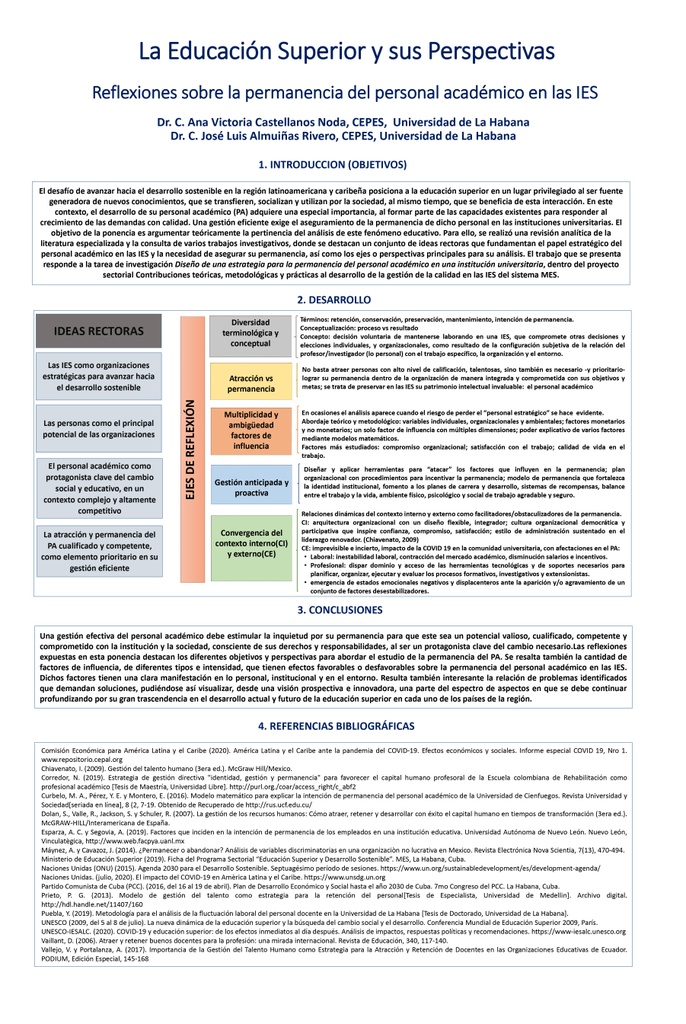
Simposio La Educación Superior y los retos para el futuro, internacionalización e integración en la región
PER
XVI Taller Internacional “La Educación Superior y sus Perspectivas”.

Resumen
El desafío de avanzar hacia el desarrollo sostenible en la región latinoamericana y caribeña reconoce el valor del conocimiento en el cumplimiento de los objetivos y metas planteadas. Ello posiciona a la educación superior en un lugar privilegiado al ser fuente generadora de nuevos conocimientos, que se transfieren, socializan y utilizan por la sociedad, al mismo tiempo, que se beneficia de esta interacción. En este contexto, el desarrollo de su personal académico adquiere una especial importancia, porque forma parte de las capacidades existentes para responder al crecimiento de las demandas con calidad. Una gestión eficiente exige el aseguramiento de la permanencia de dicho personal en las instituciones universitarias. El objetivo de esta ponencia es argumentar teóricamente la pertinencia del análisis de este fenómeno educativo. Para ello, se realizó una revisión analítica de la literatura especializada y la consulta de varios trabajos investigativos. En su contenido, se destacan un conjunto de ideas rectoras que fundamentan el papel estratégico del personal académico en las instituciones de en las IES y la necesidad de asegurar su permanencia, asi como los ejes o perspectivas principales para su análisis: lo conceptual, lo procesual ( gestión de la permanencia eficiente y proactiva), los factores de influencia, y las condiciones y exigencias internas y contextuales. Los problemas más comunes centran su atención en lo personal, lo organizacional y el entorno. Se puede plantear que los estudios sobre la permanencia del personal académico en el contexto universitario son infrecuentes y por eso hay que crearle un espacio propio, no lateral, en la agenda investigativa.
Abstract
The challence of advancing towards sustainable development in the Latin American and Caribbean region recognizes the value of knowledge in meeting the objectives and goals set. This positions higher education in a privileged place as it is generating source of new knowledge, that are transferred, socialized and used by society, at the same time, that it benefits from this interaction. In this context, the development of academic staff, acquires special importance, because he it is part of the existing capacities to respond to the growth of demands with quality. Efficient managment requires the assurance of the permanent of said personnel in university institutions. The objective of this presentation is to theoretically argue the relevance of the analysis of this educational phenomenon. For this, an analytical review of the specialized literature and the consultation of several research papers were carried out. Its contents highlights, a set of guiding ideas that support the strategic role of academic staff in HEIs and the need to ensure their permanence, as well as the main axes or perspectives for their analysis: the conceptual, the procedural (managment of efficient and proactive permanence), influencing factors, internal and contextual conditions and demands. The most commons problems focus their attention on the personal, organizational and environment. It can be argued that studies on the permanence of academic staff in the university context are infrecuent and that is why it is necessary to create its own space, not lateral, in the research agenda.
Sobre el ponente

Dr. Ana Victoria Castellanos Noda
